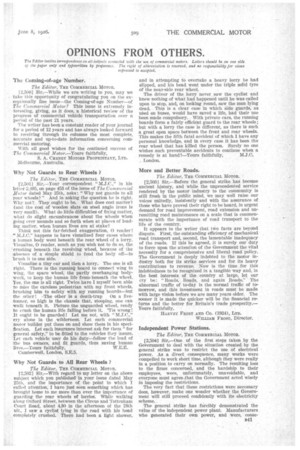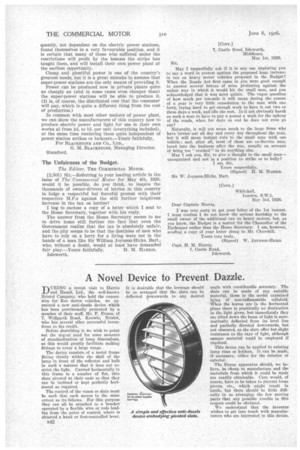OPINIONS FROM OTHERS.
Page 25

Page 26

If you've noticed an error in this article please click here to report it so we can fix it.
The Editor invites eorrespondence on all subjects connected with the use of commercial motors. Letters should be on one side of the paper vnly and tyPewritten by preference. The right of abbreviation is reserved, and no responsibility for views • expressed is acccptea.
The .Coming-of-age Number.
The Editor, THE COMMERCIAL MOTOR.
[2,500] Sir,—While we are writing to you, may we take this opportunity of congratulating you on the excepiIonally fine issue—the Coming-of-age Number—of The Commercial Motor? This issue is extremely interesting, giving, as it does, a historical review of the progress of commercial vehicle transportation over a period of the Past 21 years.
The writer has been a constant reader of your journal for a period of 12 years and has always looked forward to receiving through its columns the most complete, accurate and up-to-date information concerning commercial motoring.
With all good wishes for the continued success of The Commercial Motor.—Yours faithfully,
S. A. CHENEY MOTORS PROPRIETARY, LTD. Melbourne, Australia.
Why Not Guards to Rear Wheels ?
The Editor, TEE COMMERCIAL MOTOR.
[2,501] Sir,—Your carreSpondent. "M.J.C.," in his letter 2,495, on page 453 of the issue-of The Commercial Motor dated May 25th, asks: "Why not guards to all rear wheels?" And in .asking the question he is right. Why not? They ought to be. What does cost matter? (and -the cost. of wooden slats on steel angle irons is very small). What do little difficulties of fixing matter, what do slight encumbrances about the wheels when going over mounds and so forth when at places of loading matter, when human lives are at stake?
Think not this far-fetched exaggeration, 0 reader!
3.I.J.C." happens to have visualized four cases where a human body went beneath the rear wheel of a lorry. Visualize,. 0 reader, much as you wish not to do so, the crushing beneath the revolving wheel, because of the absence of.•a simple shield to fend the body off—to brush it to one side.
Visualize a tiny car and then a lorry.The one is all right. There is the running board to connect wing to wing, the spare wheel, the partly overhanging bodywork, to keep the human life from•beneath the wheei. Yes, the one is,all right. Twice have I myself been able to miss the careless pedestrian with my front wheels, brushing him to safety with my running boards—but the other ! The other is a death-trap On a five • tonner, so high is the chassis that, stooping, one can walk beneath it. Picture the unguarded wheel, ready to crush the human life falling before it. 'Tis wrong! It ought to be guarded! Let me not, with " cry alone in the wilderness. Let each commercial motor builder put them OD and show them in his specification. Let each insurance interest ask for them " for general safety," to be-fitted to the vehicles they insure. Let each vehicle user do his duty—follow the Iced of the bus owners, and fit guards, thus saving human lives.—Yours faithfully,
w.E.n.
Camberwell,. London, S.E.5.
Why Not Guards to All Rear Wheels ?
The Editor, THE COMMERCIAL MOTOR.
[2,502] Sir,—With regard to my letter on the above subject which you published in your issue dated May 25th, and the importance of the point to which I called attention, I have just seen something which has brought home to me more than ever the importance of guarding the rear wheels of lorries. While walking along Oxford Street, between the Circus and Tottenham Court Road, about 4.30 in the afternoon of the 28th ult., I saw a cyclist lying in the road with his head completely crushed. There had been .a light shower, and in attempting to overtake a heavy lorry he had slipped, and his head went under the triple solid tyre of the near-side rear wheel.
The driver of the lorry never _saw the cyclist and knew nothing of what had happened until he was called upon to stop, and, on looking round, saw the man lying dead. This is a clear case in which side guards, as uked on buses, would have saved a life, had their use been made compulsory. With private cars, the running boards form a fairly efficient guard to the rear wheels ; but with a lorry the case is different, as there is such a great open space between the front and rear wheels. This makes the fifth fatal accident of which I have any personal knowledge, and in every ease it has been the rear wheel that has killed the person. Surely no one wishes such preventable accidents to continue when a
remedy is at hand?—Yours faithfully, M.J.C. . London.
More and Better Roads.
The Editor, THE COMMERCIAL MOTOR.
Sir,—Before the general strike has become ancient history, and while the unprecedented service rendered by the motor industry to the community is still fresh in the public mind, we may well raise our voices unitedly, insistently and with the assurance of those who have proved their right to be heard, in urgent demand for road improvement, road extension and unremitting road maintenance on a scale that is commensurate with the importance of road transport to the life of the country. It appears to the writer that two facts are beyond dispute. First, the outstanding efficiency of mechanical road transport and, second, the lamentable inadequacy of the roads. If this be agreed, it is surely our duty to force upon the attention of the Government the vital necessity for a comprehensive and liberal road policy. The Government is deeply indebted to the motor industry both for its strike services and for its heavy contributions to revenue. Now is the time for this indebtedness to be recognized in a tangible way and, in the best interests of the country at large, let our cry be: "Roads, Roads, and again Roads." The abnormal traffic of to-day is the normal traffic of tomorrow, and this investment in roads must be made with large vision before we are many years older. The sooner it is made the quicker will be the financial returns and the better for Britain's trade prosperity.— Yours faithfully, •
HARVEY FROST AND CO. (1924), urn.
WILLIAM FROST, Director.
Independent Power Stations.
The Editor, TEE COMMERCIAL MOTOR.
[2,5041 Sir,—One of the first steps taken by the Government to deal with the situation created by the general strike was to restrict the use of electrical power. As a direct consequence, many works were compelled to work short time, although they were really in a position to carry on normally. The resulting loss to the firms concerned, and the hardship to their employees, were, unfortunately, unavoidable, and everyone must agree that the Government acted wisely in imposing the restrictions. The very fact that these restrictions were necessary does, however, make one wonder whether the Government will still proceed confidently with its electricity scheme.
The general Strike has forcibly demonstrated the value of the independent power plant Manufacturers who generated their own power, and were, conse quently, not dependent on the electric power stations, found themselves in a very favourable position, and it is certain that many of those who suffered under the restrictions will profit by the lessons the strike has taught them, and will install their own power plant at the earliest opportunity.
_ Cheap and plentiful power is one of the country's greatest needs, but it is a great mistake to assume that super-power stations are the only means of providing it. Power can be produced now in private plants quite
as cheaply as (and in some cases even cheaper than) the super-power stations will be able to produce it. (It is, of course, the distributed cost that the consumer will pay, which is quite a different thing from the cost of production.)
In common with most other makers of power plant,
we can show the manufacturers of this country how to produce electric power and light for use in their own works at from Id. to id. per unit (everything included), at the same time rendering them quite Independent of power station strikes or lockouts.—Yours faithfully,
For BLACKSTONE AND CO., LTD., G. M. BLACKSTONE, Managing Director.
Stamford.
The Unfairness of the Budget.
The Editor, TEE COMMERCIAL MOTOR.
[2,505] Sir,—Referring to your leading article in the Issue of The Commercial Motor for May 4th, 1926, would it be possible, do you think, to inspire the thousands of owner-drivers of lorries in this country to lodge a respectful but forceful protest with their respective M.P.s against the still further iniquitous increase in the tax on lorries?
I beg to enclose a copy of a letter which I sent to the Home Secretary, together with his reply.
The answer from the Home Secretary seems to me to drive home still further the fact that even the Government realize that the tax is absolutely unfair, and the pity seems to be that the destinies of men who have to rely on a lorry for a living were not in the hands of a man like Sir William Joynson-Hicks, Bart., who, without a doubt, would at least have demanded fair play.—Yours faithfully, H. M. HARRIS. Isleworth.
[copy.]
7, Castle Road, Isleworth, Middlesex, May 1st, 1926.
Sir, May I respectfully ask if it is any use imploring you to say a word in protest against the proposed huge increase in tax on heavy motor vehicles proposed in the Budget? When the Roads Act first came in you were good enough to answer several letters of mine protesting against the unfair way in which it would hit the small man, and you acknowledged that it was most anf air. The vague question of how much per ton-mile it will mean during the course of a year is very little consolation to the man with one lorry, trying hard to get enough work to have it out two or three days a week, and idle the rest. Is it not obviously harsh on such a man to have to pay a pound a week for the upkeep of the roads, when for days on end he does not even go out?
Naturally, it will not mean much to the large firms who have lorries out all day and every day throughout the year, but it will mean instant ruin to the small man with one vehicle ; and, after all, most of them are ex-Service men, lured into the business after the war, usually on account of being too " crocked " to do anything else.
' May I ask you, Sir, to give a thought to the small man— unorganized and not in a position to strike or to bully? I am, Sir, Yours respectfully, Sir W. Joynson-Hicks, Bart. [Cory.] Whitehall, London, S.W.1, May 3rd, 1926. Dear Captain Harris, I was very sorry to get your letter of the let instant. I must confess I do notknow the serious hardship to the small owner of the additional tax on heavy motors, but, as you know, the Budget is a matter for the Chancellor of the Exchequer rather than the Home Secretary. I am, however, sending a copy of your letter along to Mr. Churchill. Yours very truly, (Signed) W. JcaNscue-Hions. Capt. H. M. Harris, '7, Castle Road, Isleworth.Tags




























